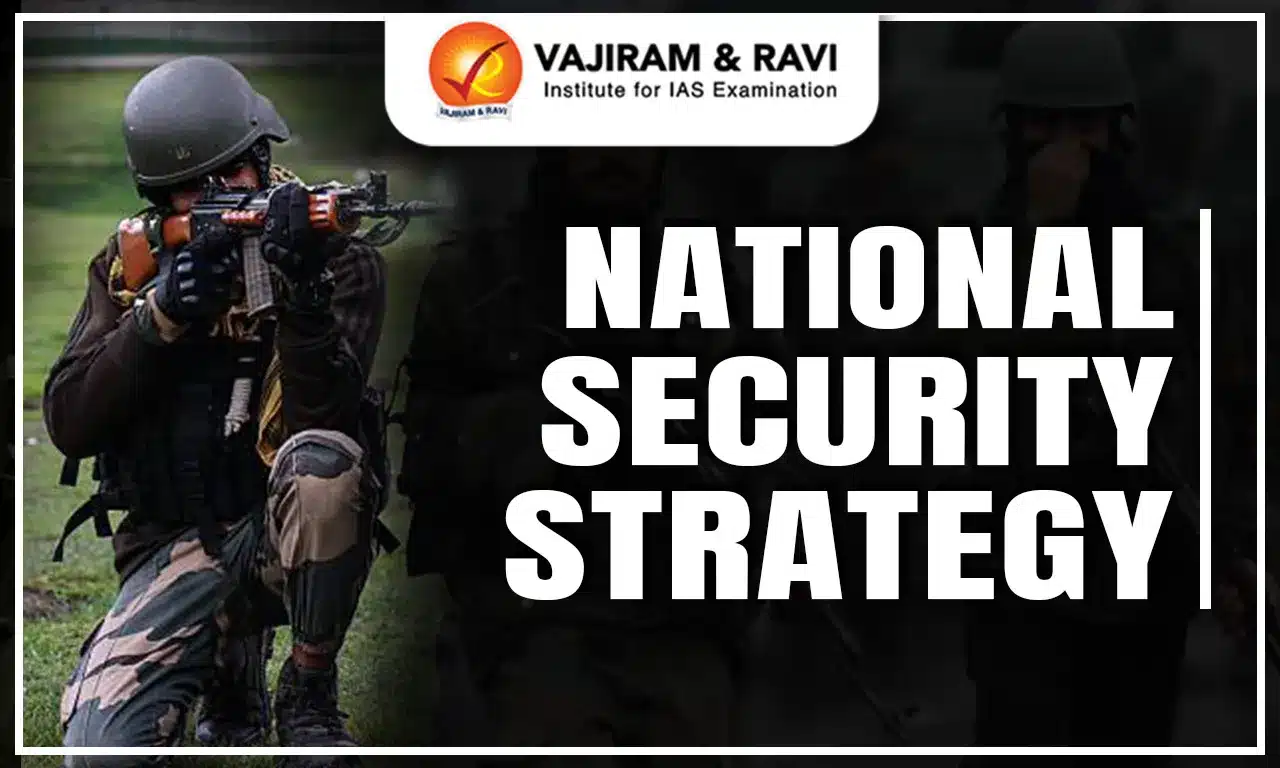National Security Strategy (NSS) is a comprehensive document that outlines a country’s security objectives, threats, and strategies to address them. It serves as a roadmap guiding a nation's approach to security matters, encompassing defence, diplomacy, economic stability, and internal security.
Many advanced nations have published and outlined their national security strategy. However, despite being a key global player, India lacks a publicly accessible National Security Strategy (NSS), a document pivotal for defining security objectives and strategies.
National Security Strategy Overview
National Security Strategy document outlines a country's security goals and the strategies to achieve them. It establishes a country's security objectives, defines its internal and external challenges, and offers guidance on achieving its national goals.
- It is updated regularly and defines threats and opportunities while introducing accountability of agencies tasked with carrying out such responsibilities.
- A national security strategy directs the military and critical defence and security reforms with strategic implications, providing a comprehensive view of overall national security, threats, and the path forward to address them.
- India is one of the few significant countries with no publicly available National Security Strategy.
National Security Strategy in India
National security strategy in India reflects a multifaceted approach to bolstering defence, protecting territorial sovereignty, and addressing emerging internal and external threats. India has made several attempts to formulate a National Security Strategy (NSS), including the Kargil Review Committee Report (2000) and the Naresh Chandra Task Force on Security (2012), which offered detailed recommendations but did not result in an official NSS.
- Kargil Review Committee Report (2000): Established after the 1999 Kargil conflict, this report offered national security recommendations. Although publicly released, it did not result in a formal National Security Strategy (NSS).
- Naresh Chandra Task Force Report (2012): This report covered national security issues, including defence and intelligence reforms, but did not lead to a formal National Security Strategy (NSS).
- National Security Advisory Board (NSAB): The NSAB has drafted several national security strategy documents over time, which were presented to various governments, but no formal National Security Strategy was established.
- Gen. Hooda's Document (2019): In 2019, Former Army Commander Lt. Gen. D.S. Hooda created a national security strategy document, representing a notable effort towards an official National Security Strategy (NSS) for India.
Need for National Security Strategy
Need for National Security Strategy in India arises from evolving threats like cross-border terrorism, cyber warfare, internal insurgencies, and geopolitical tensions, requiring a comprehensive, coordinated, and future-ready approach to safeguard national interests.
- Long-Standing Need: The concept of a National Security Strategy for India has long been debated in military and strategic circles, but despite three previous attempts, it has yet to be implemented.
- Enhanced Relevance: India is one of the top five economies and military powers in the world and a leader of the Global South. Most developed countries, such as the United States and the United Kingdom, have a published National Security Strategy.
- Urgency: Increased geopolitical tensions and a volatile global environment have made it more urgent for India to develop a comprehensive strategy, especially since both rival neighbours, Pakistan and China, have national security strategies.
- Outdated Directives: Existing directives for armed forces, like the Raksha Mantri’s operational directive of 2009, are outdated and need revision. The National Security Strategy will play a pivotal role in these directives.
- Clarity of Purpose: A National Security Strategy would provide clarity and direction to the government's security decision-making process. It would help to ensure that all agencies involved in national security are working towards common goals and objectives.
- Enhanced Deterrence: A National Security Strategy would send a clear message to potential adversaries about India's resolve to defend itself. It would also help build trust and confidence among India's allies and partners.
- Countering Emerging Threats: A national security strategy would help counter emerging threats such as cybersecurity-related attacks and new forms of terrorism, as well as traditional security threats such as porous international border management and naxalism.
National Security Strategy Challenges
National Security Strategy (NSS) remains elusive in India despite growing strategic consensus. Political hesitance, ideological divides, stakeholder differences, and resource constraints continue to delay the formulation of a cohesive and actionable strategy.
- Political Hesitance: Despite the professional backing of the National Security Advisor, National Security Council, and other agencies and three attempts, the goal of a National Security Strategy has yet to be successful, primarily due to hesitation from the political echelons, who fear constraints on decision-making.
- Various Stakeholders: A national security strategy requires reconciling the interests of various stakeholders involved in national security, including the military, intelligence agencies and diplomatic corps.
- Difference Between Ideologies: Due to political shifts in central government and the presence of coalition party governments, it is difficult to reach a unanimous consensus on the national security strategy.
- Differing Views within the Government: The NSS is a complex document that needs to be prepared quickly because it brings together various ministries and government departments.
- Various departments, including the Defence Ministry, the Intelligence Bureau, and the Home Ministry, have opposing viewpoints, so the procedure is taking time.
- Limited Resource Allocation: While India's defence budget is growing, it still faces resource constraints. These constraints make it challenging to devote sufficient manpower and expertise to the development and implementation of an NSS.
- For example, the allocation for defence expenditure increased by 10-12% over the current financial year’s budget estimates (BE), but it is below the armed forces’ expectations.
National Security Strategy Significance
National Security Strategy is significant for safeguarding national interests, ensuring territorial integrity, and responding to emerging threats. The implementation of a National Security Strategy in India could lead to clarity in vision, enhanced preparedness, modernisation and public awareness.
- Clarity in Vision: A national security strategy would offer a clear roadmap for national security, outlining priorities, threats, and responses. It will provide a comprehensive framework for decision-making.
- Diplomatic Significance: It could enhance India's image as a responsible and predictable power on the global stage, leading to stronger diplomatic relations and greater international cooperation on security issues.
- Enhanced Preparedness: The national security strategy improves India's preparedness against diverse security challenges, including cyber threats, terrorism, and naxalism, by anticipating and addressing future threats.
- Modernisation: It can accelerate the pace of military modernisation and reforms by providing a structured guideline and streamlining the armed forces to meet evolving threats.
- Public Awareness: Having a national security strategy increases public awareness about security threats and fosters a sense of brotherhood and collective responsibility among citizens.
National Security Strategy Way Forward
National Security Strategy Way Forward emphasises a holistic approach integrating defence preparedness, technological advancement, intelligence reforms, cyber security, border management, and cooperative federalism to address evolving internal and external security challenges proactively.
- Involvement of All Stakeholders: The success of the National Security Strategy (NSS) will depend on its transparency, public consultation, and its ability to strike a balance between military preparedness and other essential aspects of national security.
- Implementation of Previous Committees: While formulating the national security strategy, the government shall consider the recommendations of the Kargil Review Committee report, the Naresh Chandra Task Force on Security and the Hooda Committee.
- Citizen-centric: The national security strategy should be citizen-centric, representing people's values and beliefs while also attempting to raise public awareness and influence the public's view of national security issues.
Hooda Committee Recommendations
The Hooda Committee, established in 2019 under Retd. Lieutenant General D.S. Hooda suggested enhancing India's National Security Strategy framework through global engagement, improved neighbourhood relations, and the resolution of internal conflicts, among others.
- Global Engagement: Based on its national interests, India should confidently engage with major powers like the US, Russia, and China.
- Neighbourhood Relations: Strengthen ties with neighbouring countries through soft power, improved connectivity, and regional trade.
- Internal Conflicts: Address issues in Jammu and Kashmir, the North East, and areas of Left-Wing Extremism through development, integration, and countering radicalisation.
- Citizen Protection: Prioritise protecting citizens from global and domestic risks, such as climate change, cyber threats, and internal changes.
- Capability Enhancement: Improve capabilities for protecting citizens and deterring adversaries by securing land and maritime borders.
- Indigenous Defence: Support research and development for indigenous defence platforms.
National Security Strategy UPSC PYQs
Question 1: In the Constitution of India, the promotion of international peace and security is included in the (UPSC Prelims 2014)
(a) Preamble to the Constitution
(b) Directive Principles of State Policy
(c) Fundamental Duties
(d) Ninth Schedule
Ans: (b)
Last updated on February, 2026
→ UPSC Notification 2026 is now out on the official website at upsconline.nic.in.
→ UPSC IFoS Notification 2026 is now out on the official website at upsconline.nic.in.
→ UPSC Calendar 2026 has been released.
→ Check out the latest UPSC Syllabus 2026 here.
→ Join Vajiram & Ravi’s Interview Guidance Programme for expert help to crack your final UPSC stage.
→ UPSC Mains Result 2025 is now out.
→ UPSC Prelims 2026 will be conducted on 24th May, 2026 & UPSC Mains 2026 will be conducted on 21st August 2026.
→ The UPSC Selection Process is of 3 stages-Prelims, Mains and Interview.
→ Prepare effectively with Vajiram & Ravi’s UPSC Prelims Test Series 2026 featuring full-length mock tests, detailed solutions, and performance analysis.
→ Enroll in Vajiram & Ravi’s UPSC Mains Test Series 2026 for structured answer writing practice, expert evaluation, and exam-oriented feedback.
→ Join Vajiram & Ravi’s Best UPSC Mentorship Program for personalized guidance, strategy planning, and one-to-one support from experienced mentors.
→ UPSC Result 2024 is released with latest UPSC Marksheet 2024. Check Now!
→ UPSC Toppers List 2024 is released now. Shakti Dubey is UPSC AIR 1 2024 Topper.
→ Also check Best UPSC Coaching in India
National Security Strategy FAQs
Q1. What is the national security strategy?+
Q2. What is the security strategy of India?+
Q3. What is the structure of national security strategy in India?+
Q4. What are the 3 components of India's security strategy?+
Q5. What is the concept of national security in India?+
Tags: national security strategy quest UPSC Internal Security Notes


















